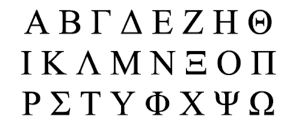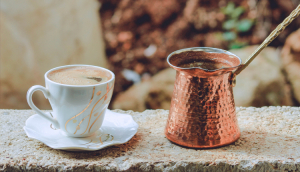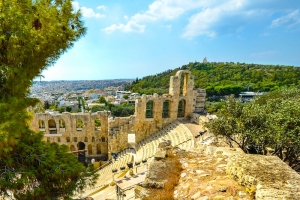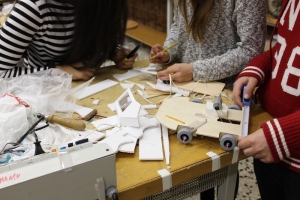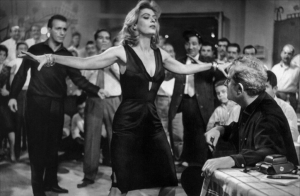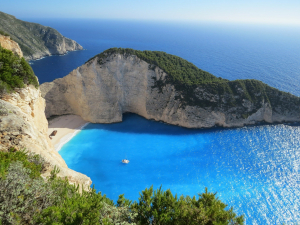XpatAthens
Let's Learn Some Greek!
1. Η μητέρα μου πάντα πίνει ένα φλιτζάνι τσάι το απόγευμα. (My mother always drinks a cup of tea in the afternoon.)
2. Τι θα πιείτε, παρακαλώ; or Θα πιείτε κάτι; (What will you drink, please? / Will you drink something? = this is what a waiter asks the customers in a restaurant) Strangely enough, when used for clothes, ‘πίνω’ means ‘to shrink’!
3. Δεν το πιστεύω! Το αγαπημένο μου μάλλινο πουλόβερ ήπιε στο πλύσιμο! (I can’t believe it! My favorite wool sweater shrank in the wash!)
Example sentences:
1. Τα παιδιά πεινάνε πολύ. Θα τους φτιάξω μία ομελέτα. (The children are very hungry. I will make them an omelet.) Keep in mind that the Past Simple form ‘πείνασα’ is very often used when referring to the present, e.g.
2. Πεινώ! = Πείνασα! Θα φάω γιαούρτι με μέλι και καρύδια! (I am hungry! I will have yogurt with honey and walnuts!)
Expressions with ‘πεινάω or πεινώ’:
1. πεινάω σαν λύκος [= I am (as) hungry as a wolf; the Greek equivalent of the English expression ‘(I am so hungry), I could eat a horse’] Πεινάω σαν λύκος! Δεν είναι έτοιμο ακόμη το φαγητό;! (I am so hungry, I could eat a horse! The food is not ready yet?!)
2. Των φρονίμων τα παιδιά, πριν πεινάσουν, μαγειρεύουν (= wise people’s children cook before they get hungry; wise people take precautions) Προσπαθώ να βάζω χρήματα στην άκρη για τα γεράματά μου. Όπως λέει και ο λαός: (I try to put aside money for my old age. As people say:) ‘Των φρονίμων τα παιδιά, πριν πεινάσουν, μαγειρεύουν’!
How To Make The Perfect Cup Of Greek Coffee
To make Greek coffee, you'll need a briki, a metal (copper is best) pot with a long handle. Brikis come in many different sizes–anything between 2 and 6 cups is acceptable. However, keep in mind that if you're serving more than 6 cups at a time, you'll need to do it in stages.
1. Greek Coffee
2. A briki
3. Water
4. Sugar
5. Demitasse cups
Step1: Take however many demitasse cups are needed and fill each with water. Then, pour the water from each cup into the briki. Add 1 heaping teaspoon of Greek coffee into the briki for each demitasse cup.
Step 2: Add sugar as needed: 1 teaspoon for metrios (medium) 2 for glykos (sweet)
Step 3: Put the briki on a gas burner and turn it on to medium-low heat.
Step 4: After a few minutes when it starts to get warm, continuously stir the mixture until it dissolves. Once all is dissolved, stop stirring.Continue to slowly heat and watch for the foam to rise and take it off right before it begins to boil. (This foam is called kaïmaki) and the richer the foam, the better the coffee.
Step 5: If it’s just one cup, pour and enjoy. However, if there is more than one, pour a little into each cup, then go back to the first, and fill up each cup to the top. The reason for this is that you spread the foam to each of the cups so it will be present in each person's coffee.
Piraeus Aims To Highlight Ancient History Via Pedestrian Walkway
March 14 - Out & About In Athens
Athens Gets Its First Makerspace Workshop For Young Professionals
Get All Your BBQ Supplies Delivered To Your Doorstep
Don't worry, it's easy! Open your laptop or tablet and log onto www.e-fresh.gr.
e-Fresh.gr is the best online supermarket that delivers your groceries within hours to the whole of Attica from 7am to 11pm on weekdays and Saturdays. The minimum value of your order must be 25€ or more, and you can by cash, POS, credit cards, even PayPal. You choose the day and time of delivery and the people of e-Fresh.gr will take it from there.
So, forget about the hassle of running to a supermarket. Get on e-Fresh.gr, create your account, shop from the comfort of your own home, and get that BBQ grill fired up!
One Of The Most Recognizable Greek Songs Of All Time
Full Moon Casts A Glow At Koroni Castle In Greece
The famous Koroni castle is saturated with Greek history. Built in the 13th century by the Venetians, the castle overlooked the ruins of an ancient acropolis as well as a Byzantine fort in the Peloponnese.
Video Source: Euronews
Rules For Domestic And International Flights During Lockdown In Greece
1. The Passenger Locator Form submission confirmation
2. The correspondence with the QR code and the Passenger Locator Form
Airlines that do not comply with the new rules will be responsible for the repatriation of passengers at their own expense.
To read this article in full, please visit: greekcitytimes.com
Greece's Beaches Rank Second In The World With Most Blue Flags
To read this article in full, please visit: greekreporter.com


